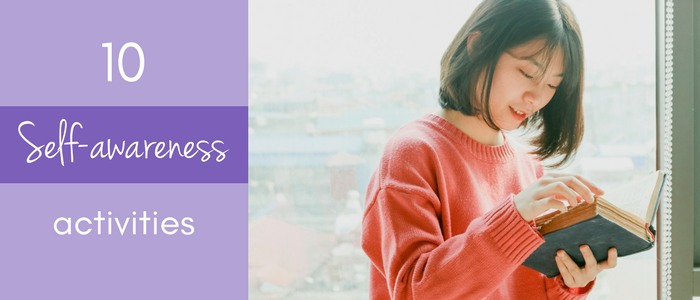10 Self-awareness activities

Here at Therapy Directory we’re big believers in the power of self-awareness. Being in touch with your physical and mental needs is so important for maintaining well-being, allowing you to truly take care of yourself.
Saying this, it’s not always so easy. Our ‘culture of busy’ allows little time to slow down and listen to ourselves. And when we do get a spare hour or two, we tend to pick up our phones to scroll through social media or see what Netflix has to offer.
Of course sometimes, this is exactly what we need. But prioritising self-awareness activities will put us all in a better position to judge what we need, and what will best serve our well-being. Here are 10 self-awareness activities to get you started.
1. Journaling
A simple notebook and pen can hold so much power. There are plenty of different journaling techniques out there to try, but if you’re new to the world of journaling, get started with some self-questioning and reflection. Ask yourself some big questions (am I happy? What do I want more/less of in my life?) or reflect on your day/week and what you’ve learnt.
2. Meditation
This could be following a formal meditation or five minutes of quiet time. Just the act of settling down, taking some time to yourself and focusing on your breathing is beneficial. Mindfulness in particular can help you take a step back from your thoughts and become the observer, encouraging you to be more self-aware day to day.
3. Practice yoga (or other mindful movement)
Being aware of our physical body is equally important and this is something mindful movement can really help with. Practices like yoga or Tai Chi encourage us to slow down and listen to our body, nourishing it with gentle movement and energy balance.
4. Reading
Just like exercise and gentle movement nourishes our bodies, reading nourishes our minds. Any kind of reading is beneficial, but to make the most of the self-awareness element, try to be mindful. If you react a certain way to a storyline for example, try questioning why. If you’re keen to learn more about a topic, look for books about it to expand your knowledge and fuel your curiosity. Not sure what book to pick up? Take a look at the Therapy Directory team’s recommendations!
5. Create a mood board
For those of us driven by visuals, creating a mood board can be eye-opening. Get as creative as you want by cutting out pictures/words from magazines, draw/write/paint pieces and put it all together to help you delve into a topic deeper. This could be how you want your future to look, musings on your career or simply what kind of holiday you want to go on next!
6. Walking
Going for a walk, especially one in nature, offers us both physical and mental space. There’s something about being in an open space that frees up your thinking, so take advantage and use this time to listen to yourself.
7. Holistic therapy
Holistic therapies look at both body and mind as one. Seeing a professional therapist can be very helpful in understanding more about yourself. A reflexologist for example, may pick up on tension you’re holding in your neck, while a Reiki practitioner may have an insight into blocked energy.
Browse our therapy topics to see which approach speaks to you.
8. Have a solo hobby
Socialising and having mutual hobbies with partners are lovely ways to spend time, but having something separate that you can dedicate alone-time too can help you cultivate greater self-awareness. Find something that prompts you to fall into a state of flow (when time seems to fly) and indulge yourself regularly.
9. Ask why three times
This can be helpful when you’re grappling with a dilemma. Simply digging a little deeper and asking ‘why’ three times can often help you get to the root of things. A simplified example:
“I hate my job” – Why?
“Because I feel tired all day” – Why?
“Because the office is stuffy” – Why?
“Because we don’t open any windows and I don’t go outside” – There is your solution!
10. Reflect
We rarely stop to look back at how far we’ve come, so it’s easy to feel unsatisfied. Taking the time to reflect and look back helps us understand ourselves better and builds confidence. Try adding ‘reflection dates’ into your calendar at the end of every month and use this time to reflect on the past month. What have you achieved? What have you learnt? What do you want to improve?

Find a therapist dealing with Guided meditation
All therapists are verified professionals


